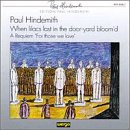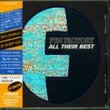| All Artists: Hindemith, Kallisch, St. Hill, Zagrosek Title: When Lilacs Last in the Door Yard Bloom'd Members Wishing: 2 Total Copies: 0 Label: Wergo Germany Release Date: 5/9/1997 Album Type: Import Genre: Classical Styles: Opera & Classical Vocal, Historical Periods, Modern, 20th, & 21st Century Number of Discs: 1 SwapaCD Credits: 1 UPCs: 4010228628623, 713746040024, 401022862862 |
Search - Hindemith, Kallisch, St. Hill :: When Lilacs Last in the Door Yard Bloom'd
 | Hindemith, Kallisch, St. Hill When Lilacs Last in the Door Yard Bloom'd Genre: Classical
|
Larger Image |
CD DetailsSimilar CDs
|
CD ReviewsA kinder, gentler version of Hindemith's Requiem (English ve Martin Selbrede | The Woodlands, Texas | 01/10/2006 (3 out of 5 stars) "The best versions of this great choral masterpiece remain Hindemith's own recording with the New York Philharmonic (not yet available on CD) and the Robert Shaw recording with Atlanta forces on Telarc. Neither is likely to be supplanted soon, although some other versions highlight interesting new facets to be found in the work (e.g., the Helmut Koch version -- see my review -- and the Wolfgang Sawallisch iteration). Both Hindemith's and Shaw's versions deliver drama and dynamism in the score in places where (one would presume) their authority should be respected. In this version, however, conductor Lothar Zagrosek evidently has a mind of his own.
Zagrosek re-thinks this work in terms of its presumed purpose. He has smoothed things over, flattened things out, lightened the textures. In some movements, the orchestral texture approaches that of chamber music. This approach works well when the orchestra is supporting the female soloist; otherwise, the results are mixed. The choir sounds excellent when it sings mezzoforte or lower. It often OUGHT to be singing louder than that dynamic, but this adjustment is calculated across-the-board by Zagrosek to achieve his personal vision of the work. Many of the movements run a little slower than usual (with the suprising exception of the fugue's coda, which is arguably the fastest on record). The work is sung in the original English, and rare is the moment when the German forces give away their native accent (e.g., on the words "of the trees prolific"). This more hushed-version of the Hindemith takes some getting used to -- it's as if it were being bent closer to the mild benignity of the Faure Requiem. At least Zagrosek's vision is coherent over the entire piece, rather than slap-dash. There are some interesting sidelights. At one time, LP enthusiasts in the '60s and '70s had favorite "reference recordings" to test stereo response. One of the favored tests for bass response was the first movement of this work, as recorded by Hindemith and the NY Phil. The low C# in the contrabass pedal held throughout the entire prelude was THE test case: if it wasn't clear and profoundly deep, your stereo just didn't cut it. Imagine my surprise to find that THIS recording, the "smooth, mellow, kinder-gentler Requiem" of Zagrosek, has the best recording of that C# -- you can easily hear that 5th string of the contrabasses being bowed. Remarkable. The baritone acquits himself well, often sounding moderately dramatic (not compared to other recordings, but in comparison to the context in this recording). Surely, this approach reveals otherwise hidden beauties in the score. But I'm not sure it's worth the price of what is missing. Although the Hindemith recordings by Wergo are thought by some to be authoritative (due to association with Schott, Hindemith's publisher), this cannot always be assumed to be the case. The reason I suspect that Zagrosek intentionally down-played this work and re-shaped it (rather than stumbling into this interpretation by neglect or accident) is because his recording, with similar forces, of Hindemith's oratorio, Das Unaufhorliche (also on Wergo), is astonishingly dramatic and powerful. So, Zagrosek COULD extract that from the orchestra and choir if he had wanted to do so. This is a matter of his personal vision being imposed on the music. I don't want to do without the other versions, but for a 3rd or 4th version to own, this is worth looking into. If you're turned off by anything bombastic, THIS version of the Requiem is for you." |

 Track Listings (12) - Disc #1
Track Listings (12) - Disc #1